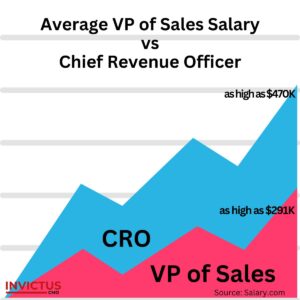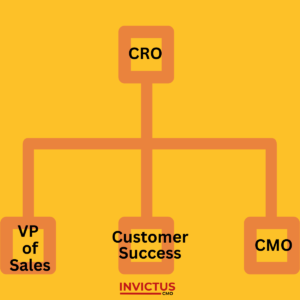
VP of Sales and CRO Salary comparison
We don’t want you to get all hung up on titles and everything, but whether we like it or not, good businesses run well when there is structure, not chaos. So in an effort to demonstrate that order, we’re going to endeavor to understand the hierarchy within sales and revenue leadership as it’s crucial for maximizing efficiency and effectiveness. One position that often sparks confusion is that of the Chief Revenue Officer (CRO). In this article, we’ll delve into the role of a CRO and explore whether it holds a higher status than that of a Vice President (VP) within organizations. Before we dive in, let’s establish a foundational understanding of Fractional CRO, a concept gaining prominence in modern business strategies.
Is a CRO Higher Than a VP?
When comparing the roles of a CRO and a VP, particularly in the context of sales leadership, it’s essential to analyze their responsibilities and organizational significance. In short, the answer is yes, in terms of seniority, a CRO would be higher than a VP. A Chief Revenue Officer is a part of the C-suite executives, whereas a VP is not. The Chief Revenue Officer salary will be reflective of this seniority as a CRO typically has a package of a hefty salary, plus bonuses, plus commission plus equity in the company, a VP of Sales has a lesser compensation package. Chief Revenue Officers often command higher salaries compared to Vice Presidents of Sales due to their broader scope of responsibilities and strategic impact on organizational growth. However, it’s not an adversarial relationship. There’s no CRO vs. VP of Sales. Rather the two work in tandem to help increase the sales revenue for the business. The CRO works at a 10,000-foot view and the VP of Sales works more closely with the sales team.
The role of a CRO is multifaceted, encompassing not only sales but also marketing, customer success, and revenue operations. While a VP of Sales typically focuses solely on sales strategies and performance, a CRO takes a holistic approach to revenue generation, aligning various departments (including marketing and customer success) toward common revenue goals.
Is a CRO a Sales Leader?

Fractional CRO presenting winning strategies
Despite the expanded scope of a CRO’s responsibilities, they are undoubtedly integral to sales leadership within an organization. As mentioned earlier, they take on a broader scope of responsibilities and strategic impact on organizational growth. They are usually overseeing the functionality of the marketing team and the customer success team as well.
In some companies, the role of a Chief Sales Officer (CSO) may exist alongside or instead of a CRO. While both positions focus on revenue generation, a CSO typically concentrates solely on sales-related activities, whereas a CRO oversees the entire revenue lifecycle.
What is the Difference Between EVP of Sales and CRO?
Understanding the distinctions between a Chief Revenue Officer and other executive positions, such as an Executive Vice President (EVP) of Sales, provides clarity on organizational hierarchy and strategic direction.
Unlike an EVP of Sales, who primarily focuses on sales strategies and execution, a CRO assumes a broader mandate, driving revenue growth across multiple channels and departments.

CROs report to CEOs
Who Reports to a Chief Revenue Officer?
One of the key indicators of a position’s seniority within an organization is the reporting structure. Examining who reports to a CRO offers insights into their level of influence and authority. Typically, the VP of Sales and the VP of Marketing and the head of customer success will report to the Chief Revenue Officer. Whereas a Chief Revenue Officer will report primarily to the CEO and sometimes the COO as well.
It’s evident that the role of a Chief Revenue Officer carries significant weight within organizations. As businesses strive for revenue optimization and growth, understanding the nuances of sales leadership positions becomes increasingly important. Whether you’re considering implementing a Fractional CRO model or simply seeking to clarify organizational roles, the insights provided in this article can guide you toward informed decision-making.
Why not reach out to us to determine what your fractional CRO options are. Fractional executives can offer substantial cost savings to small to midsize businesses compared to hiring full-time, in-house executives.
We’ll be ready when you’re ready to increase your revenue! Schedule your private CEO Flash Focus call with us today. It’s a preliminary focused and high-level 15-20-minute meeting with CEOs to highlight the main challenges. No selling. Just solutions.


